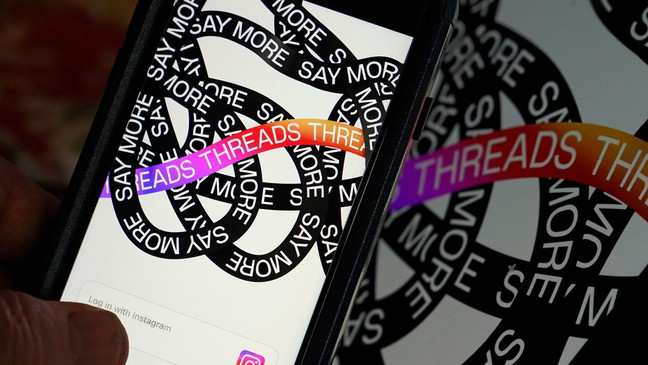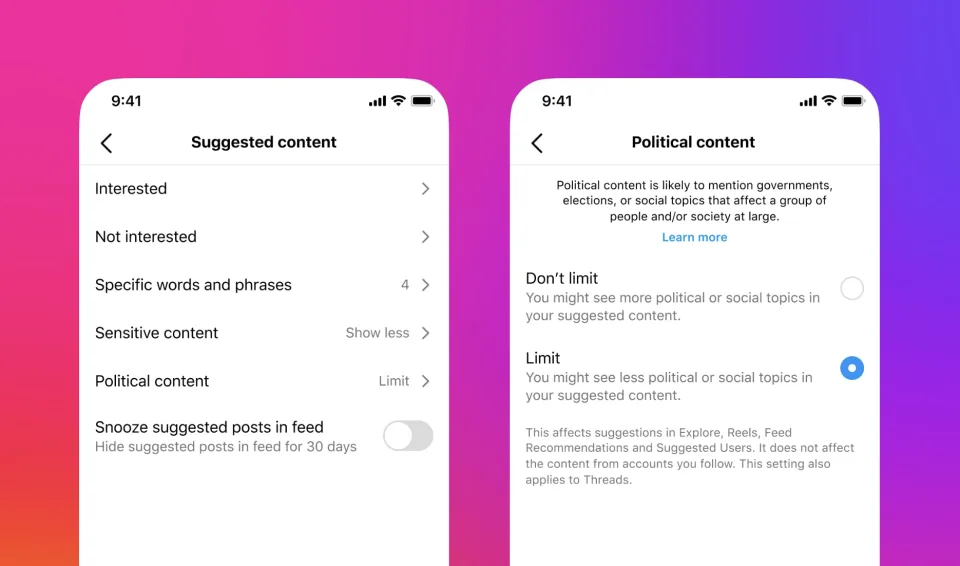
How does one define “political” content? Despite the Mark Zuckerberg-led social media behemoth promising last week to crack down on the subject on both Instagram and Threads—an unprecedented move that will have profound effects on public discourse—Meta has notably failed to address this crucial question.
Adam Mosseri, the Meta executive in charge of Instagram and Threads, stated in a series of postings introducing the decision that the business does not wish to “proactively amplify political content from accounts you don’t follow.” The platforms will continue to display information from the accounts that users have choose to follow, according to Mosseri, but the business will “avoid recommending political content” to the general public.
“Our goal is to preserve the ability for people to choose to interact with political content, while respecting each person’s appetite for it,” Mosseri explained.
The community, many of whom had just left Elon Musk’s X in search of a reliable platform to share information, was shocked by Meta’s announcement in the autumn that Threads is “not going go to amplify news on the platform.” This announcement is further reinforced by the broad and ambiguous decision to remove some content it deems undesirable.
And while some at first saw the move to curtail political content as a good thing—possibly lessening the platform’s capacity to algorithmically suggest false or provocative content and leading users down dangerous rabbit holes—many quickly expressed concern, questioning the decision’s scope and justification in the lead-up to a crucial election.
Judd Legum, who publishes his reports on the site often and produces the independent Popular Information magazine, told me on Wednesday that “the fact that there is no definition is concerning.”
Operating a social media safe haven that is shielded from the daily onslaught of upsetting news coming out of D.C. is undoubtedly a tall objective (though the comments left on Mosseri’s postings may suggest otherwise). It’s easier said than done, though. Ultimately, a great deal of possible information fits neatly into the “political” category.
Billionaire Mark Cuban, echoing the view of a plethora of others, responded to Mosseri’s post on Threads by saying,
“The challenge is identifying what is or isn’t political content.” “How are you going to decide what is and isn’t?”
Regarding Cuban, Mosseri did not respond, and Meta has sidestepped inquiries.
Charlie Warzel, a staff writer at The Atlantic who covers the nexus of politics, technology, and culture, told me that “meta seems unable to define ‘political’ content.” To be fair, it’s a difficult request, particularly during an election year, as politics is entwined with pop culture, news about innovation, business, health, and science, and not some neatly contained aspect of life.
Even while the firm has become intolerant of political discourse on its platforms, it continues to support sponsored political posts with impunity. Since 2018, the corporation has made about $4 billion in political and social issue advertising, according to Meta’s Ad Library.
According to a Meta representative, Mosseri was unavailable for an interview on Wednesday due to travel and was not able to provide explanation on the new policy. I did not receive a response when I inquired whether Mosseri may have time later in the week. It appears that when Mosseri wants to discuss a topic, he would rather sometimes respond to postings on Threads that he chooses, rather than giving interviews to the media.
(Does another social media leader come to mind?)
Instead, the Meta representative provided this evasive statement: “Our definition of political content is content likely to be about topics related to government or elections; for example, posts about laws, elections, or social topics. This definition is informed by research.” Due to the complexity and dynamic nature of these global concerns, this definition will change as we continue to interact with the communities and individuals that utilise our platforms, as well as with other experts who can help us improve our methodology.
The statement didn’t provide any answers—just additional questions. Many things fall under the category of “social topics.”
Does this include things like climate change, for instance? concerns pertaining to women’s rights? LGBTQ problems? Meta just won’t comment.
Parker Malloy, the author of The Present Age newsletter, said to me, “As an LGBTQ person who occasionally writes about her own life and as an independent publisher, my concern is that my writing and links will get swept up into the ‘political’ category, whether or not it actually is about politics.”
It goes beyond merely social concerns. Will articles discussing the fight against false information on digital platforms be deemed “political”? What about articles dispelling myths around vaccinations? Perhaps dispelling the ridiculous Taylor Swift Super Bowl conspiracy claims with information? Consider sharing a video of Jimmy Kimmel making jokes about the status of the nation while attending the Oscars.
And since news outlets provide updates on the White House or the 2024 election, would users no longer be suggested to them? Has Meta thought that this would lead to publishers drastically altering their usage of its platforms and stopping the publication of crucial content there? Will a celebrity’s account be blocked too, like Swift, if they publish a political endorsement?
While most users would probably prefer not to have divisive information boosted into their feeds, Warzel contended that one issue facing firms such as Meta is that audiences don’t appear to know what they want social networks to do regarding moderation.
“It’s this awful no-win situation,” Warzel continued, “where audiences want platforms free of politics but don’t want hyperpartisan garbage to run wild and unchecked, and Meta is making a sweeping editorial decision in order to make fewer editorial decisions.”
